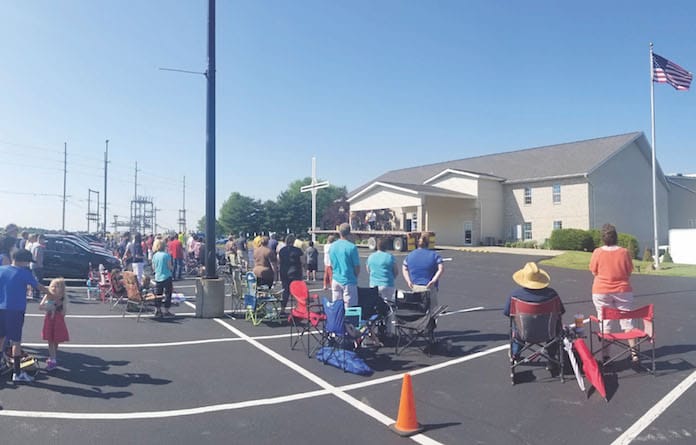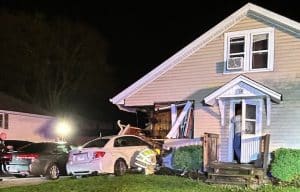Churches preach safety upon reopening

One of the most contentious aspects of measures across the country intended to slow the spread of coronavirus has been the prohibition of religious services.
The U.S Supreme Court decided 5-4 on May 30 to deny hearing a petition from a California church arguing that state’s restrictions discriminated against religious services, with the court saying the limitations were within California’s rights.
The court also declined to rule on a similar lawsuit from an Illinois church after the state changed its rules to allow for religious services during Phase 3 of Reopen Illinois.
That move has been met with relief and caution in Monroe County.
“While this is a great blessing for us as followers of Jesus to again be able to gather with our brothers and sisters in Christ, it does not mean the threat of COVID-19 has passed. It is still very real,” Daryl Skaer, youth and families pastor at First Baptist Church of Waterloo, said in a YouTube video discussing the new regulations.
The Illinois Department of Public Health released the guidelines, which can be viewed at dph.illinois.gov/covid19/community-guidance/places-worship-guidance, while noting they are not mandatory and that the state does not endorse in-person services.
“This guidance does not obligate or encourage places of worship to resume in-person activity,” the IDPH wrote. “Indeed, it is strongly recommended that places of worship continue to facilitate remote services, particularly for those vulnerable to COVID-19… Even with adherence to physical distancing, multiple different households convening in a congregational setting to worship carries a higher risk for widespread transmission of the virus that causes COVID-19, and may result in increased rates of infection, hospitalization and death.”
According to the IDPH, the safest options are for houses of worship to continue with remote services. That includes streaming services online or hosting drive-in services, provided that precautions like having only one household per vehicle and parking vehicles six feet apart are followed.
Churches in Monroe County have mainly been using those remote options so far, with virtually every church providing a streaming option and several holding drive-in services.
Life Community Church also held a picnic-style service on May 31, with over 300 churchgoers spread across its grass in lawn chairs or on blankets.
“I think that just shows that people are ready to be out but adhering by the rules,” Pastor Jamey Bridges said.
Similarly, the IDPH said “the desire for the human connection of worshipping together, particularly during a time of crisis, is understandable.”
So, the department provided recommendations for “relatively safe” options for worship services.
One of those is to congregate outdoors while maintaining social distancing, wearing face coverings, regularly sanitizing restrooms and refraining from activities like singing and group recitation because those “significantly increase the risk of transmission of the virus by projecting respiratory droplets.”
If a church does have those activities, the IDPH recommended physical distance should be increased to 10 feet and face coverings should be worn.
Another relatively safe option would be to have indoor services with groups of 10 or fewer people. All precautions should still be followed, with singing and group recitation especially discouraged indoors.
If a place of worship wants to do more than those options, the IDPH recommended limiting services to 25 percent of building capacity or 100 attendees. To facilitate that, churches should have multiple services, use a reservation system, implement a safety and cleaning plan and extend the capacity limit gradually.
Again, the IDPH stressed that the riskiest activities like singing, food and beverage service, greetings, person-to-person contact and communal touching of objects like offering plates should be avoided.
The state also provided detailed guidance on the minutiae of services, including individual, cleaning, social distancing and physical space reconfiguration protocols. Additionally, it directed individuals to the Centers for Disease Control and Prevention’s advice on worship services.
Monroe County religious leaders were accepting, overall, of the recommendations.
“We’re going to adhere to those,” Hope Christian Church Community Outreach Pastor Josh Boyer said. “We’ve talked to the department of public health here in Waterloo and gotten guidance from the administrator there, John Wagner.”
“Once we found out that we could safely reopen, as long as we took precautions, we jumped on that,” Boyer added.
Bishop Edward Braxton, who leads the Diocese of Belleville – which administers Catholic churches in the area including Monroe County – sent a letter June 3 outlining the Catholic church’s procedures and stance on the guidelines.
“The guidance given by the governor’s office should be studied and observed carefully by all priests and deacons and the parish leaders and teams assisting in the reopening of the churches in our diocese,” Braxton wrote.
How closely the recommendations are followed varies with each church.
First Baptist Church of Waterloo announced it plans to “regather” for in-person worship starting this Sunday, June 21, to give it time to devise and implement safety procedures.
It will also begin holding in-person meetings of its adult bible studies with 10-person limits, social distancing and sanitizing measures in place.
The church, like others that spoke with the Republic-Times, still encouraged its members to stay home and attend virtually if they believe that is best.
“There is no pressure for you to return immediately if you’re uncomfortable,” Skaer said.
Life Community Church surveyed its members to see what people would be comfortable with, and Bridges said it is looking to reopen as soon as possible.
“Our plan moving forward is we’re going to ease into the in-person,” Bridges explained. “I think we have to be smart about it.”
Bridges said his church will cap attendance and have an RSVP system. It will also have social distancing, multiple services and a face covering requirement. It will not have children’s church or serve coffee.
Boyer said Hope Christian Church is still determining its plans, but it could hold in-person services as soon as this Sunday.
Boyer said his church will have limited capacity, social distancing, multiple services, no contact with surfaces like doors and water fountains and hand sanitizer stations.
“We’re still taking the precautions and taking everything very seriously,” Boyer emphasized. “We’re going to be every bit as safe as Walmart or any place that’s open and is a large place like ours.”
The county’s Catholic churches have ample guidance, as the diocese released dozens of pages of recommendations on reopening.
Those documents, which closely mirror state and federal guidelines, cover both an overall plan and specific parts of service like the Eucharist, which Braxton said churches could celebrate on Sunday with safety procedures in place.
Ss. Peter & Paul Catholic Church in Waterloo, for example, plans to open Sunday with a maximum of 100 parishioners or 25 percent of the church’s capacity. Masks will also be required, social distancing practiced and hand sanitizer frequently applied.
Immaculate Conception Church in Columbia, which continues to offer virtual services via YouTube, hosted “park and pray” masses in its parking lot this past weekend.
“I am counting on the parish leadership to be mindful of the seriousness of this pandemic and act out of an abundance of caution,” Braxton wrote. “Do not rush to reopen if you are not truly prepared. Move at your own pace. Be sure that all safety precautions have been taken. Be certain that volunteers have been well trained. Double check your supplies.”
Although it will require exhaustive preparation and may lead to spikes in cases of the virus, religious leaders said their services were essential for various reasons.
“It’s community. To us, it’s no different from not being able to be around family,” Bridges said. “It’s a fraction of what it was, but it’s a little bit of normalcy. For most people who are willing to come into our building, they’ve been out whether at Schnucks or Walmart. I think that’s why you find some people saying ‘why can’t I go to church? If I can do what I just did, why can’t I go to church?’”
Boyer said religious services are both a commandment from God and a benefit to people by providing community and a mental health boost.
“We have a command to do (gather corporately) from the Bible, but we know that people need to be together,” Boyer said. “There’s something that happens that’s powerful and uplifts people.”






